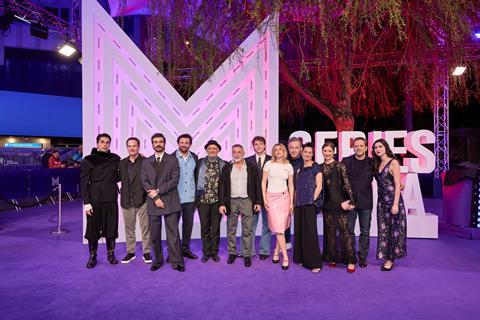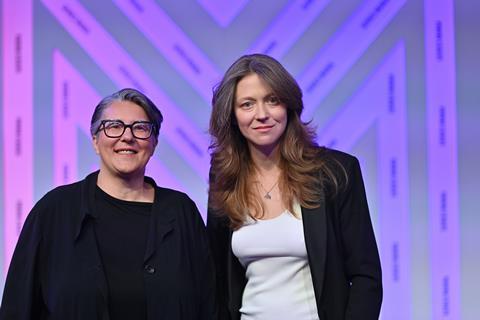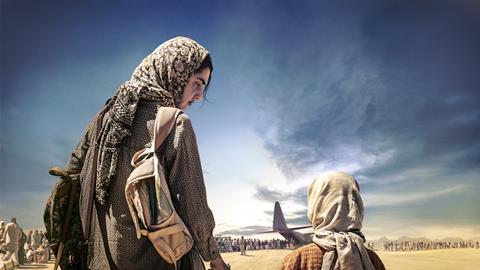Unpacking how 11 buyers, French producers, the Greek army and Polish directors got Kabul off the ground
With it’s a massive €20m budget, 11 countries co-producing, a large ensemble cast from several continents, multiple languages on set and a storyline about a geopolitically-charged event that happened just a few years earlier whose global repercussions are still being felt, six-part drama-thriller Kabul should have been a complicated, years-long struggle to produce both creatively and financially.
Instead, the scripted series about the Taliban’s rise to power in Afghanistan managed to achieve what is a near impossible feat in today’s current climate, namely to nearly seamlessly leverage funding to maintain a high production value, while maintaining creative freedom for its artistic team.

The show, which had its world premiere in international competition at Series Mania earlier this week, is set in August 2021 as Americans and their Nato allies prepare to leave Afghanistan, with the Taliban poised to take over Kabul.
Based on true events, the series centres on an Afghani family and weaves in multiple storylines of main characters from Germany, France, Italy, and the US all closely involved with the evacuation.
It is produced by France’s Cinétévé and 24 25 Films, a Mediawan Company, in collaboration with Belgium’s Panache Productions and La Compagnie Cinématographique, and Greece’s Blonde Audiovisual Productions.
It is also one of the first series to bring together public service broadcasting groups The Alliance and New8 for a trans-European effort, a timely feat in today’s budget wary climate.
That means 11 partners: France Télévisions and ZDF in Germany co-produce with the New8 - made up of The Netherlands’ NPO, Belgium’s VRT, Sweden’s SVT, Denmark’s DK, Finland’s YLE, Iceland’s RUV, Norway’s NRK and ZDF - while Greece’s Cosmote TV is also onboard. The show is produced in association with RAI in Italy.
Getting off the ground
While the action-packed, tense-ridden series takes place over several days in August, the project has been three and a half years in the making.
Thibault Gast of 24 25 Films tells Broadcast International: “It began literally the day after the events, in September of 2021.”
While it may have since taken on epic proportions, the series was born during a relaxing family holiday. Cinétévé producer Fabienne Servan-Schreiber was on holiday with her son Matthias Weber – co-founder of 24 25 Films – when she heard about the situation in Kabul and ended up working to help several Afghan families escape.
“We knew we had to tell this story,” Gast says.
“Greece responded to all of our criteria - a 40% cash rebate, locations that resembled Kabul, a diverse population for extras and capable crews”
Sandrine Paquot
The project was first spearheaded by Servan-Schreiber and Charlotte Ortiz for Cinétévé and Weber and Gast for 24 25 Films. Right away, the production team boarded showrunners Olivier Demangel and Thomas Finkielkraut, two of the country’s top screenwriting talents spanning both feature films and series, who co-wrote the scripts, assisted by Joé Lavy.
The project sparked early interest from France Televisions’ head of cinema Manuel Alduy who, with his team of co-producers Morad Koufane and Nathalie Decoin, embarked The Alliance and coordinated the exchanges between co-production countries and producers to begin moving forward.
Mediawan entered the picture early on too and Mediawan Rights is selling the show internationally alongside Entourage Ventures, which further boosted the budget and positioned the series on the international market.
Narratives, tax credits & Greek army support
The story was originally meant to focus on one Afghan family amidst the chaos – “we wanted to highlight the people in the country, particularly the women,” Gast explains - but the narrative shifted as partners joined up.
“Once the Alliance was on board, we needed to open the narrative to Italian, German and French characters,” she says, with the series now featuring diplomats from each of the different countries working to evacuate both locals and their citizens with the American secret service. The latter must coordinate efforts to control the influx of civilians seeking to escape Taliban rule.
All parties involved were set on bringing a truthful version of events to the screen. “From the beginning, ZDF wanted to portray the reality of how they acted during the withdrawal, which was badly,” Gast adds.
“The Italian storyline was based on a real-life young Italian consul, and the French embassy-centred narrative is also inspired by real events.” First and foremost, the series had to appeal to the widest international audience.
“We never felt like anyone was putting the brakes on anything - it was always very positive feedback and our creative teams never felt threatened”
Thibault Gast
Head of production Sandrine Paquot, whose credits include several large-scale films and series including Thomas Bidegain’s Iceland-shot Suddenly and Asterix and Obelisk: The Middle Kingdom, came onto the project in the Spring of 2023 with the daunting task of finding a place to shoot Kabul outside of Afghanistan.
After a deep dive into several shooting locations and narrowing those down to Jordan, Morocco and Greece, she says the latter emerged as the ideal choice.
“Greece responded to all of our criteria - a 40% cash rebate, locations that resembled Kabul with a neutrality in the architecture for added authenticity, a diverse population that allowed us to easily cast extras of different nationalities, and capable crews.”
Another added bonus was the immediate support of the Greek army that Paquot says was “one of the main reasons we chose Greece. The army gave us exclusive access to locations, their airplanes and facilities and was a real determining factor.”
Filming took place between April and July of 2024, with the show shot in Athens and its surroundings, including areas of Piraeus, the military air bases Elefsina and Tatoï, and the Halivourgiki abandoned factory.
Pirovolia, Keratea and Katsimidi provided landscapes for the mountain scene, the Afghan village and the Taliban Encampment.
Producers also praise Greece’s Blonde, which notably filmed Tehran in Greece, and Cosmote TV, which pre-bought the series and allowed production to shoot in Athens in buildings they had made accessible for filming, in particular Ote Kallithea.
“The challenge was turning Athens into Kabul,” explains Poland’s Kasia Adamik, who co-directed with Olga Chajdas, and credits Greek production designer Kostas Pappas with “recreating the energy of the place, finding what stands out, the way people act and the colours.”
Aadmik adds: “It is more about the feeling of a place rather than just the aesthetics and he managed to capture it perfectly.”
Language and extras
The series was shot 70% in English and 30% in the local language of Dari, a decision that meant characters from the same country are often speaking English between themselves, but Gast explains: “We choose to maintain Dari to keep the story authentic, but the choice of the English language immediately places the series among the greatest international shows. However, it will be dubbed in local languages in certain territories.”
While the colossal amount of co-producers from different countries put the series at risk of becoming its own international conflict, Gast says that France Televisions led the charge.

“They handled the logistics of managing the different versions of the scripts and synthesised everything, which made it much easier for us to move forward. We weren’t involved in any of the debates - that would only have caused us to lose time.”
He adds that despite the large group of commissioners, “we never felt like anyone was putting the brakes on anything - it was always very positive feedback and our creative teams never felt threatened.”
In addition to a large international cast that includes Eric Dane, Jonathan Zaccaï, Shervin Alenabi, Darina Al Joundi, Hannah Habdoh, Gianmarco Saurino, Thibault Evrard, Vassilis Kukalani, Olivier Rabourdin, Jeanne Goursaud, Ludwig Blochberger, and Valentina Cervi, the series also features hundreds of extras standing in for what were thousands of Afghans and foreign residents fleeing their homes.
Gast explains: “Casting extras in this series was extremely important. We captured the reality of the emotion of the moment since many of them were actually exiles and had experienced their own family dramas. Plus, the diversity of the Greek population allowed us to blend different physiques.”
Plus, Paquot adds: “Many of them spoke neither Greek nor English, and we spent time making sure that ethically we explained that they would be thrust back into scenes that visually looked like what they had experienced in real life, so it may be traumatic.”
According to Adamik, “it was like the Tower of Babel on set with so many different languages. It was quite cacophonous and particularly challenging when shooting the big crowd scenes, but it added richness to the story and was part of the excitement of this international series.”
Into the frying pan
Showrunners Demangel and Finkielkraut were not on set and Chajdas says that while the multilingual scripts did not leave room for improvisation, “once we were on set, we felt we had complete freedom, which is amazing considering the scope of this big project and all of the channels and countries involved.”
While Greece offered financial and aesthetic incentives, shooting during the summer months in the country proved challenging.
“It was very, very hot,” Adamik explains. “The actors were wearing military gear, we were on the tarmac of the airport with 300 extras in 41 degree weather, it was like a frying pan with nowhere to hide.”
In addition to the physical production obstacles, “we needed to build up the emotional suspense with all of the intertwined storylines, to remain close to our characters without losing the big picture of the story.”
While the series does have hard-hitting geopolitical tension at its core, Gast says the team tried “to tell a very objective story.”
And while the show was made as a one-off mini-series, as Gast points out, the real-life drama has continued since the cameras stopping rolling.
“It’s crazy that we finished a series that deals with the condition of women in Afghanistan and every day through production and post, we had to add things since their conditions were getting worse and worse, dramatically degrading all the time.”








No comments yet